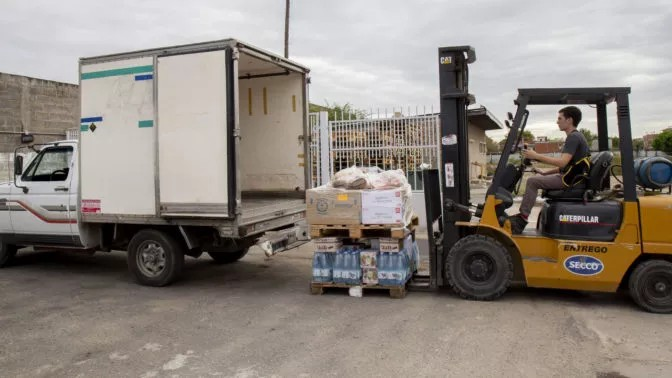As U.S. ‘trucker convoy’ picks up momentum, foreign meddling adds to fray
There is growing momentum in the U.S. anti-vaccination community to conduct rallies similar to Canada's “Freedom Convoy” that has paralyzed Ottawa, Ontario, and the effort is receiving a boost from a familiar source: overseas content mills.
Some Facebook groups that have promoted American “trucker convoys” similar to demonstrations that have clogged roads in Ottawa are being run by fake accounts tied to content mills in Vietnam, Bangladesh, Romania and several other countries, Facebook officials told NBc newsaid Friday t removed trucker convoy groups run by overseas actors. Many anti-vaccine onspiracy-driven groups have moved to embrace convoy organizing.

There is growing momentum in the U.S. anti-vaccination community to conduct rallies similar to Canada's “Freedom Convoy” that has paralyzed Ottawa, Ontario, and the effort is receiving a boost from a familiar source: overseas content mills.
Some Facebook groups that have promoted American “trucker convoys” similar to demonstrations that have clogged roads in Ottawa are being run by fake accounts tied to content mills in Vietnam, Bangladesh, Romania and several other countries, Facebook officials told NBC News on Friday.
The groups have popped up as extremism researchers have begun to warn that many anti-vaccine and conspiracy-driven communities in the U.S. are quickly pivoting to embrace and promote the idea of disruptive convoys.
Researchers at Harvard University’s Shorenstein Center on Media, Politics and Public Policy first noted that large pro-Trump groups had been changing their names to go with convoy-related themes earlier this week. Grid News reported on Friday that one major trucker convoy Facebook group was being run by a Bangladesh content farm.
Many of the groups have changed names multiple times, going from those that tap hot-button political issues such as support for former President Donald Trump or opposition to vaccine mandates, to names with keywords like “trucker,” “freedom” and “convoy.” Facebook allows groups on its platforms to change names but tracks the changes in each page’s “about” section.
The motivations of the people behind the content mills are not clear, but Joan Donovan, director of the Shorenstein Center, said the pattern fits existing efforts to make money off U.S. political divisions.
“In some ways, it’s normal political activity,” Donovan said. “In other ways, we have to look at how some of the engagement online is fake but can be a way to mobilize more people.”
“When we see really effective disinformation campaigns, it’s when the financial and political motives align,” she added.
The groups frequently directed users away from Facebook toward websites that sold pro-Trump and anti-vaccine merchandise, a spokesperson for Meta, the parent company of Facebook, said. The spokesperson noted that the majority of the content posted in these groups came from real accounts and that the company has removed the groups tied to foreign content mills.
“Voicing opposition to government mandates is not against Meta’s policies,” the spokesperson said in a statement. “However, we have removed multiple groups and Pages for repeatedly violating our policies prohibiting QAnon content and those run by spammers in different countries around the world. We continue to monitor the situation and take action.”
The details of foreign interference come as anti-vaccine protesters, pro-Trump groups and QAnon supporters have shifted their full attention to making trucker convoys a reality on American roads. Anti-vaccine protesters, some of whom are truckers, have clogged roads in Ottawa for more than a week, demanding the Canadian government remove mask and vaccine mandates.



Comments